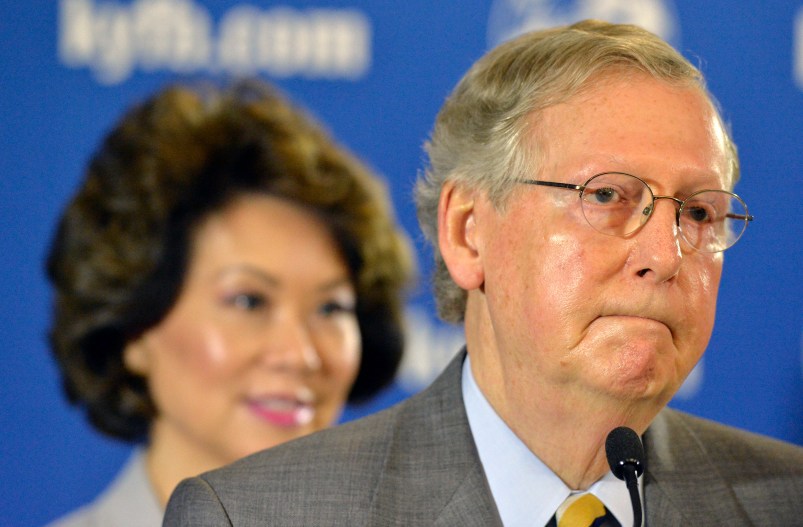With the 2014 midterm elections coming down to their last fortnight (excepting, of course, probable runoffs in Georgia and Louisiana), the spinmeisters are preparing to massively over-interpret the results. Some implications, of course, will be evident or at least plausible. If there’s a big bipartisan repudiation of governors, that would indicate the election was not, after all, a mere “referendum on Obama” but a ballot test for all incumbents sharing in responsibility for “wrong track” conditions.
If Democrats hang onto the Senate, it could be a sign that the election was not as “nationalized” as expected, or inversely, that a national GOTV effort succeeded in helping them overcome the usual “midterm falloff” problem. And if Republicans win Senate control, it will show their ability to take advantage of a very favorable landscape and adjust to unexpected challenges like viable independent candidacies in Kansas and South Dakota, or underwhelming campaigns like those of Thom Tillis and David Perdue.
But is any of this an omen for what will happen in the next cycle, as big elements of the punditocracy will undoubtedly try to make it? Not so likely. 2016 will feature a different electorate (younger and more diverse) and a very different landscape. In the Senate, that landscape will go from being extremely pro-Republican this year (21 Democratic seats up, 8 in states carried by Romney, and 15 GOP seats up, just one in a state carried by Obama) to being extremely pro-Democratic in 2016 (24 GOP seats up, 7 in states carried by Obama, and just 10 Democratic seats up, none in states carried by Romney). Only three of this year’s Senate battlegrounds (North Carolina, Colorado and Iowa) are expected to be presidential battlegrounds (if a fourth, Georgia, becomes one, that will be very good news for Democrats).
Moreover, the issue landscape and candidate dynamics in 2016 are likely to be different. If the U.S. economy continues its slow but steady improvement, by 2016 the “economic issues” will likely focus on the quality rather than the quantity of jobs. While it’s possible the sort of plague-of-frogs international environment the U.S. is dealing with now will continue or even intensify, that’s hardly probable. And of course, whereas 2014 is an indirect and partial “referendum” on Barack Obama’s performance as president, 2016 will be more of a “two futures” campaign dominated by presidential nominees. The likely (though hardly certain) Democratic nominee, Hillary Clinton, is probably not going to be viewed as any sort of protege of or surrogate for Obama, thanks to her own vast public profile.
What happens between November of 2014 and November of 2016 matters a great deal, of course. But as most honest observers recognize, no matter which party controls the Senate, the federal government is likely to experience continued gridlock occasionally punctuated by a bipartisan compromise, a unilateral executive action, and perhaps a rupture along the lines of the 2013 government shutdown. The president will be more exposed to direct blame for gridlock than before if Harry Reid’s not in charge of the Senate to act as a shock absorber. And appointments of executive-branch officials and lower court judges could well come to a halt with a Republican Senate. But that’s not likely to be a political game-changer in the long run.
So no matter what happens, 2014 is likely to be a sui generis election with little or no predictive value with relatively low immediate consequences. Logically, then, no national party should be able to claim the results as a fresh mandate, particularly since the issue landscape of Campaign 2014 has been so diffuse and unstable.
Yes, if Democrats hang onto the Senate, they (and the president) can argue a sort of implicit permission to keep on keeping on with an agenda on which they cannot act legislatively, but they are more likely to treat it as a negative repudiation of Republican obstruction and extremism. If Republicans win the Senate and make significant House gains, they will almost certainly claim voters want them to “restrain” the president, particularly in terms of dramatic executive action on immigration, the environment (EPA rules) and energy (the Keystone XL pipeline, which for all we know Obama may have already decided to approve). But abject surrender may be the only alternative to executive action, and it’s unlikely Obama will decide to spend the last two years of his presidency like he spent a big part of his first four: begging Republicans for cooperation they’ve already decided not to provide.
If the idea of more two more years of gridlock depresses you, it could be — and may be — at lot worse. We could go on for some time with two parties of relatively equal strength, one dominating midterms, the other presidential elections, with little common ground, and no one able to muster the landslide that would give either party the united control of the White House and Congress, including 60 reliable Senators to overcome filibusters, needed to implement an agenda. So hold onto your butts, as Samuel Jackson’s character in Jurassic Park liked to say. The real mandate from 2014 is likely to be a lot more of the same.
Ed Kilgore is the principal blogger for Washington Monthly’s Political Animal blog, Managing Editor of The Democratic Strategist, and a Senior Fellow at the Progressive Policy Institute. Earlier he worked for three governors and a U.S. Senator. He can be followed on Twitter at @ed_kilgore.
This post has been updated to include North Carolina as a presidential battleground state.


